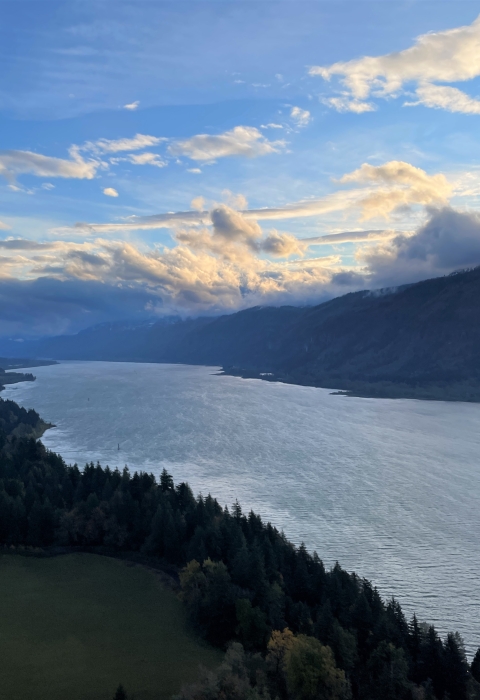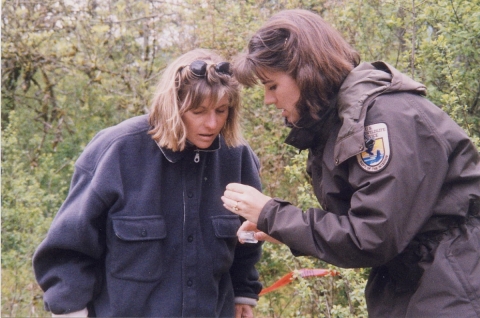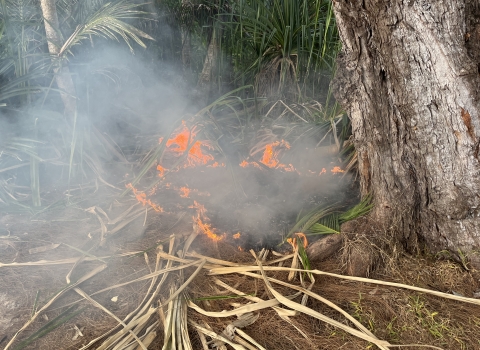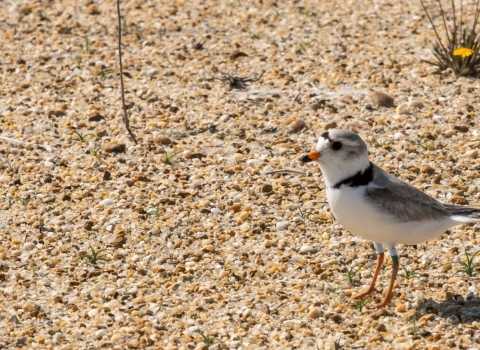“I started out having fun and it turned into a career,” said Cheri Anderson, the recently retired information and education specialist for the Columbia River Gorge National Fish Hatchery Complex, a job she held for nearly 30 years. Anderson provided educational programs and outreach for the Gorge complex, which includes six national fish hatcheries in Washington and Oregon.
From Kalispell, Montana, Anderson grew up just a 30-minute drive from Glacier National Park. She was always excited to go there and was an interpreter even at a young age. When visiting, she’d make the family stop to get informational pamphlets and stop to look at every plant.
Anderson was part of an avid outdoor family, and her grandfather was a big part of that – Faye Couey was one of the first big game wildlife biologists for the state of Montana, a pioneer in his field, and prominent bighorn sheep researcher.
Inspired by her grandfather, Anderson was one of the few in her family to graduate from college. Science was always her passion; she says there was never any question about it.
However, Anderson’s path was not straightforward; early on, she was discouraged from pursuing a degree in wildlife biology by a professor who told her she would never be employed as a woman in that field. As a result, she earned a degree in education and became a teacher. But after three years as a high school teacher, Anderson refocused on her early passion, went back to school for a degree in wildlife biology, and found a job with the National Park Service in Grand Teton National Park as a park ranger after all. It was there she discovered she loved interacting with the public and educating people visiting the parks.
“I wanted to be a park ranger for the National Park Service since about third grade and was one of those people who actually made it happen,” she said. “My goal in life was to wear green and gray [uniform] and I did it, and it was amazing.”
Many important life events occurred for Anderson at Grand Teton National Park. In that role, she had supervisors who became some of her greatest mentors and received foundational training that shaped her career. She even met her husband and got married there.
“I feel like I got such interpretive background, such basis for professionalism. I think my high bar comes from those beginnings, truthfully. It really shaped who I am professionally,” she remembered.
And in 1998, Anderson left her last National Park Service post from Natchez Trace Parkway in Mississippi to take a job with the U.S. Fish and Wildlife Service at the Columbia River Gorge National Fish Hatchery Complex in the Pacific Northwest.
When Anderson arrived at the Gorge complex, the outreach program was a blank canvas – she made it her own, creating a program that would eventually become a notable success across the region.
At that time, the now widely celebrated Salmon in the Classroom program was not yet established, and there was merely one fishtank in a school when she started. Anderson started making connections and built the program over the next 20 or more years.
She got to know the people, the kids, and the community. In a profession that would often celebrate moving around and not staying in one place too long, Anderson reaped the benefits of years of connection. “I started making this argument that long term connections with these local communities is stronger,” she said.
In 2018, Anderson was recognized for her work with the Service’s prestigious Rachel Carson Sense of Wonder Award, an award that honors employees who have shown creativity, dedication, and visionary leadership in interpretation and environmental education. The award recognized Anderson for her immense contributions over the decades:
“We’ve seen the results of her work in two decades of creating, building, and sustaining community-based and on-site hatchery interpretive programs, annual events, and visitor experiences:
- Tens of thousands of area youth reached through the Salmon in the Classroom program Cheri created and delivers annually to between 30-36 schools each year.
- Thousands of children that probably caught their first fish at a free fishing event Cheri either directly organized or helped area partners carry out.
- Tens of thousands of people who have learned about the U.S. Fish and Wildlife Service, Pacific salmon, and the National Fish Hatchery System by reading brochures, interpretive panels or touching interactive iPads in immersive visitor centers Cheri played a key role in designing.
- Hundreds of youth and community college volunteers who have seen and helped day-to-day hatchery operations thanks to fish spawning opportunities Cheri organized.”
– Sense of Wonder Award nomination by Sean Connolly, USFWS Retired
For Anderson, receiving this award was the pinnacle of her career and a big honor.
Anderson also reflected on the mentors throughout her life who inspired her to achieve her goals – her grandparents, parents, husband, and even her two children who have taught her so much, seeing the world through their eyes. She noted friends and colleagues in the Service, her early supervisors back in her National Park Service days, and partners she worked closely with at the Bonneville Dam, including the late David Weiss. She remembered Weiss as a big influence and noted his impact on her life and the significance of his passing. He was, “…the epitome of a storyteller and a connector with kids, and he was a mentor. That one was tough. He still comes to mind a lot.”
Anderson hopes she has been a good mentor to those who will continue to carry the torch. And to that generation, she gives sound advice, remembering the importance of connections with people throughout her life and career.
“It's finding those people that connect with you, validate you, encourage you that your work is worthwhile,” she said.
And when asked what advice she would give to her younger self or others coming up in the field, she offered this additional wisdom:
-Package yourself as valuable.
-Know your strengths. Think before you speak. Expose yourself to people in higher positions and learn from them.
-Remember all the things, the accomplishments, that got you to a certain spot.
And what’s next for Anderson? She plans to spend time traveling, camping, mountain biking, seeing her daughter get married, and volunteering.
Stories by Cheri Anderson:
Burbot Across the Border | U.S. Fish & Wildlife Service
Salmon...A Pacific Northwest Icon | U.S. Fish & Wildlife Service
Conserving Our Past: A Reflection Over Time | U.S. Fish & Wildlife Service







